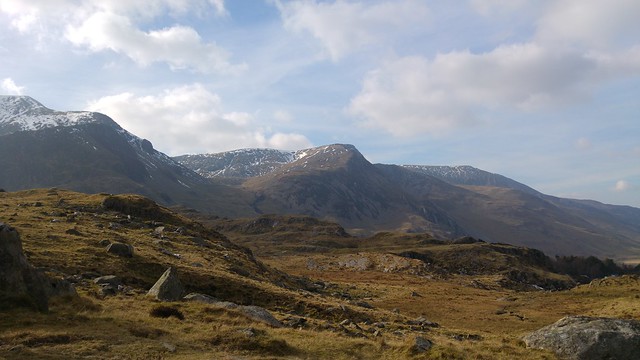Words for land, parish, enclosure and related things in Celtic languages.

Words marked with a * are reconstructions.
| Proto-Celtic |
*landā = (open) land |
| Gaulish |
landa = land |
| Old Irish (Goídelc) |
land, lann = building, house, land, plot, plate |
| Middle Irish (Gaoidhealg) |
land, lann = building, house, land, plot, plate
íarlann = pantry
ithlann, ithla = threshing floor, barn, granary, storehouse; garden, orchard |
| Irish (Gaeilge) |
lann = land, ground, plot, house, building (especially a church)
bialann = canteen, restaurant
leabharlann = library
longlann = dockyard
réadlann = observatory
saotharlann = laboratory |
| Scottish Gaelic (Gàidhlig) |
lann [l̪ˠaun̪ˠ ~ l̪ˠan̪ˠən] = enclosure, enclosed area, precinct; repository; house, church
amharc-lann = observatory
biadh-lann = canteen, dinning hall, refectory
broc-lann = badger’s den, sett
long-lann = dockyard
fasg-lann = shelter
lann-eaglaise = church precinct
leabhar-lann = library
obair-lann = laboratory
suin-lann = dormitory
ur-lann = esplanade, green |
| Manx (Gaelg) |
lann = enclosure, habitation
lhonglann = dockyard
lioarlann = library
seyrlann = laboratory
reayrtlann = observatory |
| Proto-Brythonic |
*llann [ˈl͈anː] = land, area, plot, sacred place, churchyard |
| Middle Welsh (Kymraec) |
lánn, lann, lan, llann = land
lannerch, llanerch, llennyrch = a clearing, glade |
| Welsh (Cymraeg) |
llan [ɬan] = (parish) church, monastery, heaven, churchyard
llan gadeiriol = cathedral
llan (y) gwyryfon = nunnery
llan y plwyf = parish chuch
llandref = village, small town, church village
llandy = parsonnage, glebe-house
llangeidwad = churchwarden
llanaidd = glade-like, open, clear; ecclesiastical, (of a) church
llannerch = a clearing, glade, oasis, pasture, court, empty space, patch, place, area |
| Middle Cornish (Cernewec) |
lan = a church, an inclosure, yard, church-yard
lanherch = glade |
| Cornish (Kernewek) |
lann [lan:] = yard
lannergh = glade |
| Old Breton (Brethonoc) |
lann = moor, heath, moorland |
| Middle Breton (Brezonec) |
lann = moor, heath, moorland
lanneg, lannek, lannell = land covered with moor
landonenn = swath
lann = monastery, church |
| Breton (Brezhoneg) |
lann [ˈlãnː] = moor, heath, moorland
lanneg = land covered with moor |
Etymology: from the Proto-Indo-European *lendʰ- (land, heath) [source].
Words from the same Proto-Celtic root, via Gaulish and Latin, include lande (moor, moorland, heath) in French, landa (a (sandy) plain) in Spanish, landa (country, field, piece of land) in Basque [source].
The (archaic) English word laund [lɔːnd] (a grassy plain or pasture, especially surround by woodland; a glade) possibly comes from the same Proto-Celtic root, via Middle English, Old French and Gaulish, or from the Proto-Germanic *landą (land), which comes from the same PIE root [Source].
Words from the same PIE roots include land and lawn in English, land (land, country) in Dutch, Land (country, state, province, land) in German, land (land, country, nation, state, ground, earth) in Swedish, land (country, land) in Danish, lado (uncultivated, wild land) in Czech, and ледина [ˈlɛdina] (untilled land) in Macedonian [source].
| Proto-Brythonic |
*pluɨβ = countryside, parish, common people, parishoners |
| Middle Welsh (Kymraec) |
plwyf, plwy = parish, parishioners, people
plwyvog = parishioner, parochial
plwyfol = parochial, lawfully settled in a parish |
| Welsh (Cymraeg) |
plwy(f) [pluːɨ̯(v) / plʊi̯(v)] = parish, poor relief, parishioners, people
plwyfo = to settle in a parish
plwyfog = parishioner, parochial
plwyfol = parochial, lawfully settled in a parish
plwyfoldeb = parochialism |
| Old Cornish |
plui = parish |
| Middle Cornish (Cernewec) |
plew, plui, plu = parish |
| Cornish (Kernewek) |
pluw = parish
pluwek = parishioner (m), parochial
pluwoges = parishioner (f) |
| Old Breton (Brethonoc) |
pluiu, plueu, ploeu, ploi, ploe = country, countryside |
| Middle Breton (Brezonec) |
ploeou, ploe, ploé = country, countryside
plouisyen = peasant, rural |
| Breton (Brezhoneg) |
ploue [pluːe] = parish (historical – appears in placenames), countryside (literary)
plouead = country, earthy
plouezad = peasant, rural
plouk [pluːk] = yokel |
Etymology: from Latin plēb(ē)s (common people, plebians), from Old Latin plēbēs, from Proto-Italic *plēðwēs Proto-Indo-European *pl̥h₁dʰwḗh₁s ~ *pl̥h₁dʰuh₁és, from *pleh₁- (fill) [source].
The French word plouc [pluk] (hick, country bumpkin, yokel) was borrowed from Breton plouk in the late 19th century [source].
Other words from the same roots include fill, folk, pleb (a commoner, a common, unsophisticated, cultureless person), plenty, plural, plus and public in English [source].
| Middle Irish (Gaoidhealg) |
parráiste = parish
pairche = parish, diocese |
| Irish (Gaeilge) |
paróiste [ˈpˠaɾˠæʃtʲə] = parish
paróisteach = parishioner, presentable person, parochial
paróisteachas = parochialism |
| Scottish Gaelic (Gàidhlig) |
parasite [parɪʃdʲə] = parish
eaglais parasite = parish church
neach-parasite = parishioner |
Etymology: from Anglo-Norman paroche (parish), from Late Latin parochia (parish), from Ancient Greek παροικίᾱ (paroikíā – a dwelling abroad), from πάροικος (pároikos – neighboring, foreigner), from παρά (pará, beside) + οἶκος (oîkos – house). [source].
| Scottish Gaelic (Gàidhlig) |
sgìre [sgiːrʲə] = district, parish
sgìreachd [sgʲiːrʲəxg] = parish |
| Manx (Gaelg) |
skeerey = parish
skeeragh = parochial
skylley = parish |
Etymology: from Old English sċīr (office, district, region, shire), from Proto-West Germanic *skīru (office, district), from PIE *(s)ker- (to cut). The English word shire comes from the same roots [source].

Sources: Wiktionary, Am Faclair Beag, Online Manx Dictionary, Teanglann.ie, eDIL – Electronic Dictionary of the Irish Language, In Dúil Bélrai English – Old Irish glossary, An Etymological Dictionary of the Gaelic Language, Geiriadur Prifysgol Cymru, Gerlyver Kernewek, Dictionaire Favereau, TermOfis, English – ProtoCeltic WordList (PDF), Etymological Dictionary Of Proto Celtic












